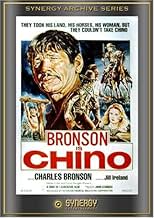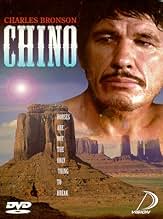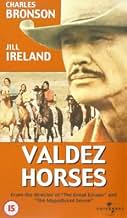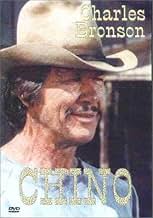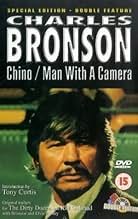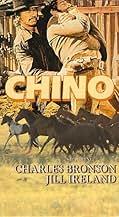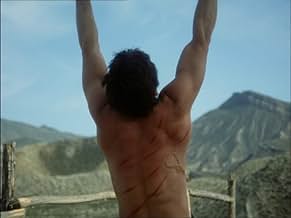AVALIAÇÃO DA IMDb
6,0/10
3 mil
SUA AVALIAÇÃO
Uma adolescente fugitiva e um criador de cavalos de raça mista fazem uma amizade improvável contra o pano de fundo de dificuldades partilhadas.Uma adolescente fugitiva e um criador de cavalos de raça mista fazem uma amizade improvável contra o pano de fundo de dificuldades partilhadas.Uma adolescente fugitiva e um criador de cavalos de raça mista fazem uma amizade improvável contra o pano de fundo de dificuldades partilhadas.
- Direção
- Roteiristas
- Artistas
José Nieto
- Mexican
- (as Jose Nieto)
Diana Lorys
- Mexican
- (cenas deletadas)
- (as Diana Loris)
Conchita Muñoz
- Mexican
- (as Conchita Munoz)
Henri Bidon
- Cowboy
- (as Henri Bidon Mikaleffs)
Florencio Amarilla
- Little Bear
- (não creditado)
Annamaria Clementi
- Native American Girl
- (não creditado)
Enrique García Santiago
- Chino's Attacker
- (não creditado)
Eduardo García
- Chino's Attacker
- (não creditado)
Avaliações em destaque
...with some touching moments. From the title you wouldn't expect much, but I liked this film a lot and wonder why it is almost never aired on TV. Bronson and Van Patten have a great chemistry and their on-screen relationship is very believable. The story is simple, with an interesting beginning and a good, plausible ending. The soundtrack is nice, too.
The only thing I would change in this film is to make it longer, add more scenes so we can get to know the characters in various settings, and delve into the background to the conflict between Chino and his neighbors.
I recommend this film, especially to fans of Charles Bronson. I will definitely watch this film again (finally saw it for the first time, after all these years!).
The only thing I would change in this film is to make it longer, add more scenes so we can get to know the characters in various settings, and delve into the background to the conflict between Chino and his neighbors.
I recommend this film, especially to fans of Charles Bronson. I will definitely watch this film again (finally saw it for the first time, after all these years!).
'Chino' is a surprisingly engaging western which stars Charles Bronson as the haggard central character, trying to tame wild horses, and the young protégé which sort of falls into his lap, played by 1970's stalwart Vincent Van Patten). Bronson tries to keep his business in order, when meanwhile, a guy with an impossibly long Italian name tries to fence him in! And to make things worse, he falls in love with impossibly-named Italian guy's sister (played by Jill Ireland). Amazingly, this actually is a bit of fun, because Bronson is well, Bronson, and it's fun to see a real life couple such as Bronson and Ireland blow sparks off of each other. The ending is verrrrrry 1970's, absolutely nothing is resolved, I mean, NOTHING! It's quite an interesting movie. Check it out!
After directing Clint Eastwood in the western caper "Joe Kidd (1972)" (which I really like), the following year director John Sturges' helm the European western "Chino (1973)" that starred Charles Bronson. However these two films share very little in common. Sturges ably directs, but this one relies heavily on Bronson's presence and the unusual way things go on to play out in this very fragmented story. Nonetheless I didn't find it to be like your standard western / spaghetti item. It was broodingly slow, and the action saw very little to no daylight. It had a strange emotional and at times spiritual pull (like a stirring dream sequence) between the characters, that kind of made it unpredictable and primarily dreary. The material never sticks to one story, but moves about quite a bit in a typically mellow and subdued fashion. More often it focused on the convincingly growing relationship between Bronson and Van Patten, and their laboured effort on the ranch. Some of these plots don't add anything to the central idea, but still manages to compel (while not be completely satisfying) by giving the main characters some personality and weight. Bronson's performance bares someone who's genuine, and with a manner that still intimidates, but can show that warm side with not a care in the world to get into any sort of conflict. The unhinged ending beautifully paints that angle. Quite a curious turn on his part. Working alongside him was an exceptional show-in by Vincent Van Patten and his fellow squeeze at the time Jill Ireland provided some fire to the chemistry. Sturges simply knows how get striking location choices in the framing, and cinematographer Armando Nanuzzi formulates it accordingly with the on-screen action. Although the thing that hit me was Guido and Maurizio De Angelis' folksy casual music score of soothing attraction and swing. Creaky, but oddly intriguing little-known western.
"Chino" had such potential. It was directed (partially) by the great John Sturges and its star, Charles Bronson, gives a wonderful performance, exuding the kind of quiet masculine strength that no one in Hollywood has these days. Most of the complaints about the film have to do with its atypically downbeat ending. I won't spoil it for you, but I will say that I thought the ending, though viscerally unsatisfying, was intellectually and emotionally appropriate, more along the lines of something you'd read in a novel than see in a pop movie.
But what really goofs the film up is the see-saw realism brought about by being directed by two different men, the ailing Hollywood icon Sturges, and Duilio Coletti, unknown in the states, who may have been even further down the slope of his career in Europe. Formalist Sturges strove for at least the inner-logic of "movie reality." Coletti's work had devolved into the worst of sloppy Eurowesterns.
Parts of the film seem to strive for realism, using natural lighting effects, etc. But as the film progresses, more and more glaring anachronisms pop up, such as perfectly square hay bales, only possible with baling machines. This break with even a third-grader's knowledge of the old west reaches its zenith when a character burns down a house, using a PLASTIC JUG of kerosene. A PLASTIC JUG in the old west! Hard to believe that even a European wouldn't know that there was no plastic in those days. I don't know what the circumstances were behind Sturges either quitting or being fired from the director's chair part-way through the filming of "Chino," but it certainly seems as though the scenes he left missing were shot by Coletti as quickly and with as little thought as possible.
The film is also hobbled a bit by it's international origins. The villian is obviously French while his sister, played by Jill Ireland, is obviously British. Ireland has a brief bit of dialoge explaining this, but it only leaves you scratching your head all the more. Otherwise, "Chino" has many wonderful segments, thoughtful and well-acted.
As a postscript: I wish someone would restore this and other of Bronson's more unusual Euro flicks and make them available on high quality widescreen dvd. The currently available vhs and dvd versions of Chino, Red Sun, Honor Among Theives, Cold Sweat, You Can't Win 'Em All, and etc, all suck bigtime. MGM? Anchor Bay? HELLO?
But what really goofs the film up is the see-saw realism brought about by being directed by two different men, the ailing Hollywood icon Sturges, and Duilio Coletti, unknown in the states, who may have been even further down the slope of his career in Europe. Formalist Sturges strove for at least the inner-logic of "movie reality." Coletti's work had devolved into the worst of sloppy Eurowesterns.
Parts of the film seem to strive for realism, using natural lighting effects, etc. But as the film progresses, more and more glaring anachronisms pop up, such as perfectly square hay bales, only possible with baling machines. This break with even a third-grader's knowledge of the old west reaches its zenith when a character burns down a house, using a PLASTIC JUG of kerosene. A PLASTIC JUG in the old west! Hard to believe that even a European wouldn't know that there was no plastic in those days. I don't know what the circumstances were behind Sturges either quitting or being fired from the director's chair part-way through the filming of "Chino," but it certainly seems as though the scenes he left missing were shot by Coletti as quickly and with as little thought as possible.
The film is also hobbled a bit by it's international origins. The villian is obviously French while his sister, played by Jill Ireland, is obviously British. Ireland has a brief bit of dialoge explaining this, but it only leaves you scratching your head all the more. Otherwise, "Chino" has many wonderful segments, thoughtful and well-acted.
As a postscript: I wish someone would restore this and other of Bronson's more unusual Euro flicks and make them available on high quality widescreen dvd. The currently available vhs and dvd versions of Chino, Red Sun, Honor Among Theives, Cold Sweat, You Can't Win 'Em All, and etc, all suck bigtime. MGM? Anchor Bay? HELLO?
I agree that the change of directors caused a change in quality of the film, but all in all this is one of my favorite westerns. It is thought provoking and realistic. Bronson's acting comes off as natural and he understood who Chino was. His relationship with the young boy seems odd, but not forced. The scenes with Jill Ireland are amusing and show the difference in culture between Europe and the old west. Filmed in Europe, there are a few quirks that sort of make you laugh, the Native Americans and the town seem a little hokey, but the film remains enjoyable. The ending bothered me, but thats what made this a good film. I reccommend this to anyone who wants to sit and relax to a good western.
Você sabia?
- CuriosidadesFirst film of a three-picture contract that Charles Bronson had with producer Dino De Laurentiis. The second and third were Jogo Sujo (1973) and O Grande Búfalo Branco (1977). Bronson's earlier film for de Laurentiis, O Segredo da Cosa Nostra (1972) was a single-picture contract. During the 1960s, Bronson had also appeared in Uma Batalha no Inferno (1965) for de Laurentiis.
- Erros de gravaçãoIn the early bar fight, one of the stuntmen coming at Chino with a chair tosses his head back a good half second before being hit.
- Citações
Chino Valdez: That's the way Indians bury their dead. They'd rather be close to the sun than have dirt thrown in their faces.
- ConexõesFeatured in Charles Bronson, Hollywood's Lone Wolf (2020)
- Trilhas sonorasFreedown rainbow
Composed by Guido De Angelis and Maurizio De Angelis
Principais escolhas
Faça login para avaliar e ver a lista de recomendações personalizadas
- How long is Chino?Fornecido pela Alexa
Detalhes
Contribua para esta página
Sugerir uma alteração ou adicionar conteúdo ausente



